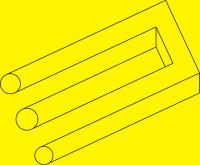Bridgeport Mill v/s Gantry Mill
- bengineer
- Offline
- New Member
-

- Posts: 6
- Thank you received: 0
Recently I picked up an old Bridgeport (VS head) mill that I'd probably classify as 'fair' condition, for the price of hauling it away. Now I start looking at that stepper package and think of it on the Bridgeport.
Now I'm a bit torn. I can restore the BP and use it to supercharge the gantry mill, or I can skip the gantry and put the stepper package on the BP.
I wouldn't be doing a full CNC upgrade on the BP, I can't afford it (e.g. ballscrews) I'd pretty much be bringing it back to good working condition, then figuring out a good way to mount the motors (and most likely pulley drives too).
Does anyone have insight into a Bridgeport CNC retrofit? Would I be wasting my time doing it if I don't upgrade to ballscrews too? If I did go BP route, is there an advantage to making the knee or quill the Z axis?
I'm kind of afraid that I hack away at a perfectly good BP, only to discover that it doesn't work quite right in the end; when I could have had both a great manual mill and a CNC gantry.
Any opinions or insight would be appreciated! Thanks!
Please Log in or Create an account to join the conversation.
- gmouer
- Offline
- Elite Member
-

- Posts: 244
- Thank you received: 9
As for using the quill or the knee for the Z axis, the knee would take much more power to move but also would move much slower than the quill is capable of. People have done retrofits both ways, quill and knee for the Z.
Please Log in or Create an account to join the conversation.
- jmelson
- Offline
- Moderator
-

- Posts: 826
- Thank you received: 160
My question is how rigid is your gantry vs. the Bridgeport? With a 2 Hp spindle, you need a quiteI've been tinkering with building a small/medium gantry mill (2 Hp / 36" x 32" x 8") and really just have the Z axis and spindle designed and built. I have 4 Axis, 400 oz-in stepper package sitting on the shelf waiting for it.
beefy structure or the cutting forces will deflect everything and cause accuracy and chatter issues.
You'd be SURPRISED at how flexible a Bridgeport is! When using a boring head, I lean lightly
on the Bridgeport head to deflect it so I don't scratch the wall of the bore when retracting the
boring head. It doesn't take much force at all to move the cutter .001", and the cutting
forces are WAY more than I can exert with my hand.
Jon
Please Log in or Create an account to join the conversation.
- Rick G
-

- Offline
- Junior Member
-

- Posts: 27
- Thank you received: 155
A good place to start is the work / material you plan to machine.
Will the gantry be used for wood, plastic, metal? How heavy a cut you plan to make and how fast you need the machine to move.
The size of the motors will play a big part in how fast the machine can move.
You can do the upgrade without ball screws and keep the handles for manual work. The problem you may run into is if the existing screws are unevenly worn. I would start by tuning and adjusting the machine to see what shape it is in.Does anyone have insight into a Bridgeport CNC retrofit? Would I be wasting my time doing it if I don't upgrade to ballscrews too? If I did go BP route, is there an advantage to making the knee or quill the Z axis?
I use the quill as (Z) for machining and the knee to position work(W).
Do a search for the kits that are available to convert your machine that will give you an idea of your options as well as the size of components and cost.
Rick G
Please Log in or Create an account to join the conversation.
- bengineer
- Offline
- New Member
-

- Posts: 6
- Thank you received: 0
Thanks for all your input, I think I probably will keep the Bridgeport a manual machine for now.
Please Log in or Create an account to join the conversation.
- jmelson
- Offline
- Moderator
-

- Posts: 826
- Thank you received: 160
Ah HA! 4:1 makes a big difference. Still, if you are going to be machining metal, even aluminum,Ah - my bad, I said "2Hp" but meant "1/2" Hp.
Thanks for all your input, I think I probably will keep the Bridgeport a manual machine for now.
rigidity of the machine frame and the axes is very important. 1/2 Hp on a 25,000 RPM spindle
is not a great deal of force, 1/2 Hp on a 1/2" end mill at 800 RPM is a lot more force trying
to deflect the machine and the workpiece. Well, finish the gantry machine, see how it works
and then you can make a more educated decision. Depends a lot on what you will be making,
too. Also, with CNC, you can always rough-cut the general shape, leaving some material
for a finish cut, which you do with a very light cut. I do that all the time, anyway, as it gives
better surface finish.
Jon
Please Log in or Create an account to join the conversation.
